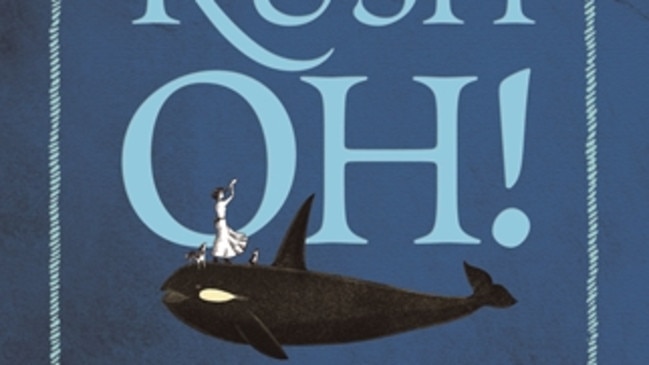Eden whalers revisited in Davidson family fictional memoir
The Eden whaling operation that employed the killer skills of a pod of orcas is revived in Shirley Barrett’s new novel.

Between 1840 and 1930 the most extraordinary thing was happening off the NSW south coast town of Eden. A pod of killer whales co-operated with a local whaling family to capture and kill baleen whales, and the orcas were paid in a portion of the carcass.
The baleens were rounded up on their migration to and from Antarctica by the killer whales, which acted like sheep dogs to herd their quarry into Twofold Bay. One of the killer whales would then go to the point at Kiah Inlet where the Davidson family lived and operated tryworks, and alert them to the whales’ presence by slapping a tail against the water. The whalers would take up the call of “Rush oh!” and hurry to their boats.
Once the baleen was captured and slaughtered the killer whales were given a turn to feed from it — only ever eating the larger whale’s lips and tongue — before the whalers towed the carcass to shore. This rare example of mutualism between humans and animals has been written about previously in Killers in Eden by zoologist Danielle Clode and the novel Killers of Eden by Tom Mead. But Shirley Barrett’s Rush Oh! is another type of tale.
A screenwriter and director, Barrett is best known for her 1996 film Love Serenade, which won the Camera d’Or at Cannes. Often the key to a good story is finding the way to tell it — and Barrett does this by writing from the perspective of Mary Davidson, the fictionalised daughter of the famous whaler George Davidson.
Rush Oh! purports to be Mary’s memoir, the sort one begins in middle age to recall the memories drifting further every year. In this case her memories are interspersed with sketches and newspaper cuttings. At the centre of Mary’s memoir is the character of John Beck, a handsome young man who arrives at the beginning of whaling season and claims to have been a Methodist minister. Mary is immediately smitten, and John does little to deter her affection.
Since she has known nothing but whaling, it takes Mary seeing it from an outsider’s perspective to realise the brutality of her father’s profession, and John provides some of this perspective, clearly shaken after his first time killing a whale. “There’s a great deal of blood in these whales,” he tells Mary.
There is also a great deal of humour in this novel, because Mary is, refreshingly, a plain and often oblivious young woman grudging of anyone who draws or dresses better than she does. One of six siblings whose mother died when she was 13, she is the eldest girl and expected to cook for the whalers and look after the house for her father.
On one occasion she is with her sister Louisa in the store looking wistfully at fabric they will not be able to afford, as they haven’t even got enough money for the supplies they are to buy. A discussion of the upcoming ball ensues:
‘‘I wonder if Eunice Martin will wear her cream lustre or her tinsel-thread organdie,’’ I said.
‘‘I imagine she will have a new dress altogether,’’ said Louisa. ‘‘It will be sewn together from the desiccated corpses of seventeen bush rats, left out to dry in the sun.’’
I snorted gleefully. How fondly I felt towards Louisa sometimes! In her meanness towards Eunice Martin, I saw that she was demonstrating her loyalty and affection towards me. In her own strange way, she was a loving sister.
The whales are themselves characters in Rush Oh!: the killers — each with a name and a distinctive personality — and the great baleens, whom Mary describes as dawdling like “recalcitrant schoolboys on their way to school; if there was a bottle, they would kick it. It is truly a wonder that they ever get anywhere.”
So it is confronting, then, to read of the suffering the baleens go through, their long, slow death. And the humour and romance do not always sit easily beside this game of hunter and hunted (at one point our narrator asks us to please not compare her tale to Moby-Dick).
But Barrett has followed Mary for a reason, and it is her voice that carries Rush Oh!, with her self-consciousness, humour and florid language, less period detail than character quirk of an odd but likable person. It is Mary who you will miss like a sister — “in her own strange way” — when the final page is turned.
Eleanor Limprecht’s new novel is Long Bay.
Rush Oh!
By Shirley Barrett
Picador, 358pp, $32.99



To join the conversation, please log in. Don't have an account? Register
Join the conversation, you are commenting as Logout